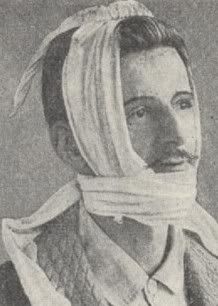[Readers, I must apologise for my lengthy absence - there is a very mundane explanation for it, which is that my electricity was cut off by the electric people because I was unable to pay their exorbitant fees and I was thus unable to make use of my computer to update my diary. I do not see why I should have to pay for electricity when it jumps out of the sky for free and when you can create it freely by rubbing a balloon against your jumper, so I refused to pay those fat-cat, money-grubbing electric men. For 6 weeks I was able to live without electricity, but yesterday I capitulated and paid them when I learned that there is a new series of Ramsay's Kitchen Nightmares on, which I could not bear to miss. More on the events of the last 6 weeks will follow later: for now, I will continue my story of the critics from where I left off last month]
Joyce McMillan of The Scotsman shuffled slowly over to me and gently took my hand, cradling it gently in her own wizened palms. No taller than 3 foot 4, with the vulnerability of damp Edinburgh rock, she nevertheless exuded an aura of powerful majesty and beneficence which ensured that I at once adopted a deferential tone.
"Now do tell me, Clive, why you wish to become a playwright," she said, beaming magnificently. Her breath smelled of honeyed almonds and nutmeg.
"I...I wish to become a...a critic," I said, unaccountably feeling guilty for correcting this wonderous lady, "Not a playwright, if you please."
"But of course," said she, letting loose my hand. "You must forgive me, dearie, for not making myself clear. All critics of the theatre are, at heart, playwrights themselves."
She took a crumpled tissue from her sleeve and spat into it, then dabbed it around my cheeks and mouth. Her saliva tasted of rhubarb-and-custard flavoured sweets I bought from sweetshops as a child, and the caramel apple pies that my plump grandmother used to make.
"There now child," she said, smiling benignly, "Your face is as clean as a Christmas whistle. Now then, why do wish do become a critic? Tell old Joyce your thoughts."
I told her of my new-found pleasure in picking faults in people's work and causing anguish.
"Oh my dear little man," she said, patting my forehead tenderly, "That is not what criticism is about. You must change your views if you wish to be a good critic. Let me cradle your head in my old bosom while I tell you my philosophy of criticism.
"Now then lovey, you mustn't listen to the other critics who've spoken to you this evening. They are cynical and petty-minded. The true critic is as much a playwright as the playwright himself. The true critic adores theatre and has as important a part to play in the overall success of the play as the playwright. You see, the playwright wrights the play (just my little joke there, dear), then the critic reviews it and tells the public to enjoy or dislike it. Theatre patrons would not know if the play was good or not if they did not have critics to tell them.
"Furthermore, the critic reads the play: he interprets it, he decides what the play is about and what it is saying. The critic does this so that the public knows what is going on. So you see, dearie, the critic is as much an author of the text as the playwright. A more important author even, for the critic is the one who decides whether the play will actually be viewed by the public or not - with a negative review, the public will not come to see the play. We truly make or break the piece.
"And yes dear, we do have to write negative reviews, but again this stems from a love of theatre. If we view a play egregious to our tastes, it offends us. Because we love good theatre, we cannot bear to allow such things to appear in public. Through necessity, we must badmouth the piece and use our powers of criticism to prevent the play from being seen by the general public who might erroneously enjoy it.
"I personally hate anything written by or starring Japs. Can't abide those yellow, rice-munching nips. And as for the ****ing Welsh..."
At hearing this racist outburst, Thom Dibdin abandoned his task of tending to Neil Cooper of The Herald, and scampered over.
"Oh Joyce, are you having one of your episodes again? Come, let's top up that sherry for you," he said.
"The ****ing French are the worst though - smelly, cowardly ****s the lot of them..." shouted Joyce.
Dibdin managed to calm her down with a little more sherry and a generous portion of wristwatch skittles. He had had a tough night tending to the whimsies of the other critics, but he did not look flushed or wearied. Leaving Joyce at the bar, crying into a sherry, he came back over to me.
"I think I've settled her!" he said with a wink and a tap of the nose. "You musn't pay too much attention to her - she was dropped on her head as a child. Half a mo! That's the two minute warning - we must get back to our seats for the second half! I hope you enjoy it!"
Wednesday, December 13, 2006
Subscribe to:
Post Comments (Atom)

No comments:
Post a Comment